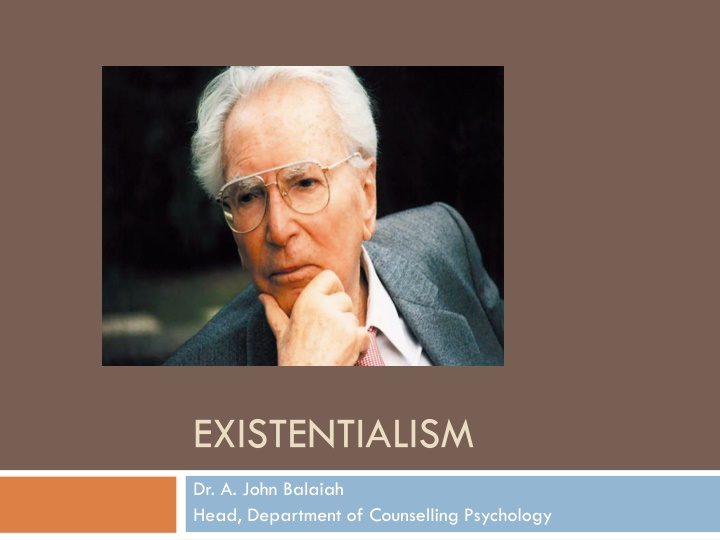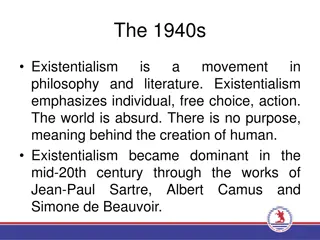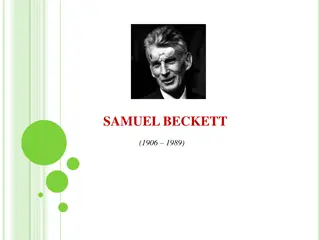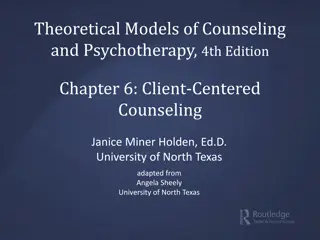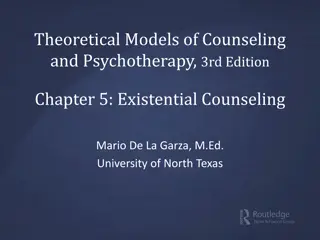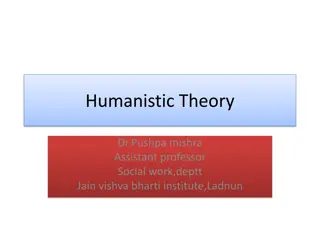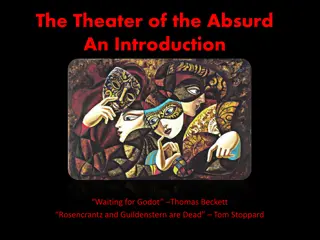EXISTENTIALISM
Dive into the realm of existentialism with a focus on key figures Viktor Frankle and Rollo May. Explore their profound insights on life's meaning, freedom of choice, and the human condition. Uncover how their experiences and philosophies shape our understanding of existence, purpose, and values in a complex world.
Download Presentation

Please find below an Image/Link to download the presentation.
The content on the website is provided AS IS for your information and personal use only. It may not be sold, licensed, or shared on other websites without obtaining consent from the author.If you encounter any issues during the download, it is possible that the publisher has removed the file from their server.
You are allowed to download the files provided on this website for personal or commercial use, subject to the condition that they are used lawfully. All files are the property of their respective owners.
The content on the website is provided AS IS for your information and personal use only. It may not be sold, licensed, or shared on other websites without obtaining consent from the author.
E N D
Presentation Transcript
EXISTENTIALISM Dr. A. John Balaiah Head, Department of Counselling Psychology
Existentialism Viktor Frankle (1905) 1942-1945 - Prisoner in Nazi concentration Camps ( Parents, brother, wife and children died) Experiences in a constructive way # dampen the spirits 1940s Ellenora MD & Ph D university of Vienna Book- Man s search for Meaning Love greatest goal and Salvation through love Everything could be taken away but not Last of human freedoms to choose one s attitudes in any given set of situations, to choose one s own way Searching for meaning and purpose Discover through actions and deeds by experiencing a value like love or achievements through work) and by suffering Many Theorists
Rollo May (1909-1994) Lived in Ohio and then to Michigan Struggles in life with two failed marriages Greek civilization and later joined Alfred Adler During his Ph D- Tuberculosis Book- The Meaning of Anxiety ( 1950) Book Love and will Questions Western attitude towards Sex and marriage Greatest personal influence was- German Philosopher Paul Tillich ( Courage to be , 1952) Psychotherapy is - Problems of being not problem solving Sex & intimacy, growing old , facing death Real challenge is Face life when one is alone Individualism should have a social interest ( Alfred Adler) Too much concern about self and little about the society If individuals are grounded on higher values then therapists will be out of business
ET Philosophical approach No techniques / No specific models Existential ideas Rejects deterministic view of human nature ( CPA & Radical behaviourism) CPS- Freedom restricted by unconscious forces RB- Freedom restricted by sociocultural conditioning ET- Freedom to choose what to make of the circumstances We are free and responsible for our choices and actions Who is the author of life? VVV Premise We are not the victims of the circumstances ET- Not to cure people like the medical model Clients are viewed as sick of life / awkward at living Process of searching for value and meaning in life
ET Many streams ( Not founded by any one person) Facing loneliness & anxiety Victor Frankle: Followed Freud. Fond of quoting Nietzsch: He who has a why to live for can bear with almost any how Logotherapy- Therapy through meaning Means to love but often has no menaing to live for Existential Vaccum May: Existence : A new dimension in psychiatry and psychology
ET James Bugental and Irving Yalom Bugental- Art of the Psychotherapist (1987) Therapy is entering deep in to the subjective world Therapists should be in touch with phenomenological world Examine, how they have answered their existential questions and challenge them to revise their answers
ET Yalom Death , Freedom, existential isolation and meaninglessness Existential Psychotherapy ( 1980) Many theories employ existential themes Four ultimate concerns , which constitute the heart of psychodynamics, have enormous relevance to clinical work
Key concepts What makes men and women human beings Current focus on clients who feel alone in this world and face anxiety in this world Significance is never fixed Continually recreate ourselves through our projects Continually question ourselves, others and world Who am I ? Who have I been? Whom can I become? Where am I going?
Basic human dimensions six propositions 1. The capacity for self awareness We are finite , potential to take act or not to act We choose and we create our destiny Meaning is not bestowed on us, we work for it Existential anxiety is part of our freedom and it makes us responsible Subject to loneliness, guilt, emptiness and meaninglessness We are basically alone, yet we have an opportunity to relate to other beings ( Walking on the hall way- with many doors) Prisoners of the past
2. Freedom and Responsibility (I am brought up this way. Makes excuses Jean Paul Sartre Inathenticity of not accepting personal responsibility Bad Faith-I am this way. I brought in a poor background. Alcoholic family To exist is never to choose excuses People are condemned to freedom. Calls for commitment We experience guilt when we are not responsible Being free and being human goes hand in hand VF- Statue of Liberty on the East Coast be supplemented with the responsibility on the West Coast Freedom is bound by certain conditions) No blame game Teach clients of their freedom & Responsibility otherwise they will neurotically dependent on the therapist Helping them to change from old patterns to New patterns
3. Striving for Identity and Relationship to others The courage to be: Core self, no self and no substance ( Greatest fears of the clients) Aloneness: Separation- we alone can give a sense of meaning to us. Relationship with self and then relationship with others It is a paradox Alone and Related Relatedness: We want to be significant in other s world Relationship with on fulfillment not on deprivation Rather than searching within ourselves, we search outside. Strangers to ourselves. Struggling with identity- Identity developed in childhood. We are trapped in the doing mode to avoid the experience of being
4. The search for meaning Do you like the direction of your life? Why am I here? What do I want from life? Problem of discarding old values- Substitutions/ Replacements ( Boat without a rudder) Create a value system based on a way of being in consistent with the way of living Meaninglessness: Is there any point of struggling since I am a mortal Page in a book quickly turned . Existential vacuum Therapy takes up meaningful way of living Existential guilt Sense of incompleteness # neurotic guilt Creating New Meaning: Even in suffering. But meaning is not something that we can directly search for . Like pleasure , meaning must be pursued obliquely By product of engagement
5.Anxiety as a condition of living Normal and Neurotic anxiety Anxiety as a potential source of growth Used as a motivation proportionate to the event Neurotic- out of proportion and it tends to immobilize people Opening up new choices is an invitation to anxiety Paradoxes of existence such as life and death, success and failure , freedom and necessity and certainty and doubt Existential anxiety is like viewing life as an adventure (Soren Kierkegaard) Too little anxiety , motivation for change is low Building new life style will be met with anxiety , but eventually anxiety will diminish with newer ways of being
6.Awareness of death and nonbeing Does not view death negatively but as a basic human condition gives significance to living Reality of the future and the inevitability of death If you think about death, then think the significance of life When we defend against the reality of death, life becomes insipid and meaningless. So complete the project when you are mortals Death is the source of zest for life and creativity. Death and life are independent, though physical death destroys , the idea of death saves us ( Yalom) Psychotherapy: Death has a major role to play. Transformation from stale mode to authentic mode Without fear of nonbeing, clients can develop a healthy awareness of death and to evaluate how well they are living Those who fear death, also fear life as though they are saying, I fear death because I have never really lived
Initial Assessment (Ruth) Good candidate for ET. Question the meaning of life and to challenge some of her comfortable, but dull patterns. Developmental Crisis Children leaving the home. Choices are open but anxiety increases. How well am I living my life? (Wife and mother).
Strengths Willingness to ask questions. Religion, Motherhood, motivation to change her life Therapeutic Relationship. Not abandoning even if she makes mistakes. Even if displeased. Not her father. Therapy is not something I do. No passive client. Dialogue in the deepest and the most genuine sense. Partners travelling. Neither knows where we are ending. Subjective viewpoint and let her know of my personal reactions. Who am I? Who have I been? Who can I become? Where am I going? Deempahasis techniques
Goals of therapy Establishing a therapeutic relationship Identifying the problem and setting the therapeutic goal Analyzing the existential source of the symptoms Reconstruction of the self Manifesting and authentic existence Not to cure of disorders but to bring them out of victim stance. Rigid way of existence. Existence is limited To discover the freedom that she possesses Help her to take steps towards liberation Responsible & Meaningful existence
Therapeutic Process Doesn t rely on techniques. However borrow techniques Certain themes that are part of human conditions Fully presence and reaction right now In what ways are you living as fully as you might? How are you living a limited existence To what degree are you living by your own choices as opposed to living a life outline by others? What choices have you made so far and how far these choices affected you? What are the choices you have now that create anxiety in you? What are some of the changes that you want to make and what is preventing them? ( Ruth s Case) Opening the closed doors. Deterministic shackles that have kept someone psychologically bound Carving out her life. Look for alternatives for making her visions become real
Therapeutic process ( Ruth) Midlife crisis. Values that have little meaning, feelings of emptiness, fears about making wrong choices. Restructuring. Anxiety. Dissatisfactions. Finding new values: Religion (once married married for life-Does not accept that position). Changes might lead to divorce or have positive impact on your relationship? Walk away from the marriage but I am scared who I would be without John (Husband)? John picked me when parents and church let off? Talking about reactions in the family but how do you want to be different?
Therapeutic process ( Ruth) Dealing with Anxiety: Whenever she thinks of changing. Being Stuck. Waking up at midnight, in cold sweats, trouble breathing, heart pounding. Worry of dying. All is not well. Anxiety as a negative thing. May be a possibility of a new starting point of her life. Increased awareness of her freedom and her sense of responsibility. Exploring the meaning of death: What I want from life before I die? Die as a sinner, go to hell for eternity. Think and talk about areas that not lived fully in life? Dead- Fun, Sexuality? Examine the quality of life? Not allowed her spirit to die> Old values have died not found new ones. Deadness as a precondition for her rebirth. Experiencing and Expressing- how she wants to live?
Outcome of Therapy No absolute answers outside of herself Open discussions How we experience each other in therapy is a new experience Being direct with the therapist Turn the other cheek-How often? Occasions that put her needs last and choose to be the giver to other. Specific situations that she fails to be assertive? Self observation process. Not to eliminate therapy but to help understand what it means. Anxiety is a signal. How does she deal? Creation of new identity She has a choice to make in spite of uncertainties and accompanying anxiety. Still have to act by making choices and then living with the consequences. She has a choice to continue therapy or terminate
